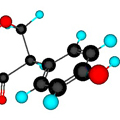Nutrigenomics
Tracking down the appetite of the genes
03.04.2009, Press releases
Diet recommendations are all the rage. Magazine covers and TV commercials herald instant slimness – and lately even health through eating. Since nutrition plays a significant role in the development of diabetes, cardiovascular disease and tumors, it stands to reason that it can also protect us from these diseases. The Nutritional physiologist Prof Hannelore Daniel at the Technische Universität München is researching the decisive mechanisms at work, from the cell to the plate.
Around 99 percent of our genetic material is identical to that of any other person. Yet we are so different. Not only in appearance: Our metabolism is also quite idiosyncratic, with every human body adapting to nutrition in its own special way. The study of nutrigenomics focuses on the interrelation between nutrition and genetic predisposition. Here, scientists study the genetic variations in our genomes and the molecular mechanisms that come into play when our metabolism adapts to a diet. In the not too distant future it will be possible to draw up personal nutrition plans geared to keeping us in good health.
Prof Hannelore Daniel from the Chair of Nutritional Physiology at the Technische Universität München (TUM) is pioneering this field in Germany. Together with her team, she is investigating the effect that individual food components have on gene expression as well as the changes in human metabolism they lead to. She has conducted a number of studies in close cooperation with partners from other European countries. In one of these projects the researchers investigated whether estrogen-like plant hormones, such as isoflavones, can protect women from cardiovascular disease after menopause.
The reduced production of estrogen after menopause leads to a higher risk of heart attacks and arteriosclerosis in women. Isoflavones found in soybeans, for example, have been available as food supplements for a number of years, without scientific proof for their effectiveness. Prof Daniel’s team has now succeeded in providing this proof: The researchers have shown that a supplemental intake of soy isoflavones enhances the production of protein building blocks in the blood. These are, in turn, important in protecting blood vessels against inflammation and thus in the prevention of cardiovascular disease.
Prof Daniel is confident that within ten years we will be able to characterize and understand in detail the individuality of human metabolism and its response to food. This will allow nutritional researchers to identify patients who are at risk for heart attacks or diabetes, for example, and who would benefit from individualized nutritional counseling or even specific nutritional supplements.
The acceptance of such genome-based nutrition appears to be rather high: “Two surveys have shown that 60 to 70 percent of the respondents would be willing to share their genetic data to create an individualized nutritional program,” Prof Daniel acknowledged. Customized nutrition may still lie in the future, but every day nutrigenomics is providing us with new insight into the complex interplay between the human genome and its nutritional environment.
Contact:
Technische Universität München
Chair for Nutritional Physiology
Prof. Dr. Hannelore Daniel
85350 Freising - Weihenstephan
Tel: 08161 / 71 3400
E-Mail: daniel@wzw.tum.de
http://www.wzw.tum.de/nutrition
Background:
For more on the topic of nutrigenomics see the website of the European Network for Excellence for Nutrigenomics (www.nugo.org). Prof Daniel is co-founder of this network with 22 partners from 13 countries and over 300 scientists.
Kontakt: presse@tum.de
More Information
| 090403_Nutrigenomik |
Druckversion dieser Pressemitteilung,
(Type: application/pdf,
Size: 132.3 kB)
Save attachment
|
|
| 090403_nutrigenomics_en.pdf |
Print version of press release,
(Type: application/pdf,
Size: 128.4 kB)
Save attachment
|




